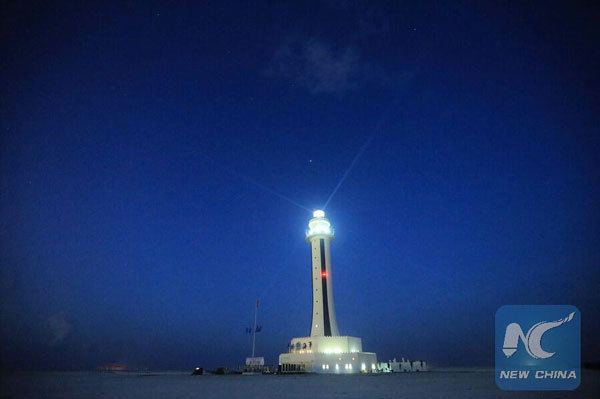Chinese officials, experts defend stance on Philippines' arbitration
Updated: 2016-05-23 11:06
(Xinhua)
|
|||||||||
 |
|
Photo taken on April 5, 2016, shows the lighthouse on Zhubi Reef of Nansha Islands in the South China Sea, south China. [Photo/Xinhua] |
BEIJING -- The South China Sea arbitration initiated by the Philippines is attracting much attention as the final ruling will be announced before the end of June.
Chinese officials and experts have defended China's stance of non-acceptance and non-participation in the case, saying the Philippines' unilateral initiation of the arbitration violates international law.
What is the arbitration about?
On January 22, 2013, the Philippines unilaterally filed compulsory arbitration against China at the Permanent Court of Arbitration in The Hague with respect to the two sides' dispute over what the case paperwork terms "maritime jurisdiction" in the South China Sea.
Since then, the Philippines has obstinately pushed for the arbitration despite China's objections.
On Feb. 7, 2014, the Chinese Foreign Ministry released a Position Paper on the arbitration, saying that it is in essence concerned with territorial sovereignty over several maritime features in the South China Sea.
The issue of territorial sovereignty is beyond the scope of the UN Convention on the Law of the Sea (UNCLOS) and the arbitral tribunal has no jurisdiction over the case, according to the Position Paper.
China has said on many occasions that since the 1970s, the Philippines has illegally seized by force maritime features of China's Nansha Islands in disregard of the UN Charter and the basic norms governing international relations, and this is "the root and direct cause" of the two countries' disputes over the South China Sea.
"The initiation of the arbitration by the Philippines under the UNCLOS is an abuse of international law as it does not satisfy the preconditions set in the UNCLOS," said Li Guoqiang, a researcher at the Institute of Chinese Borderland Studies under the Chinese Academy of Social Sciences (CASS).
"This is malicious prosecution and blackmailing behavior," Li said. "What the Philippines is doing is nothing but a thief crying stop thief."
What is the Philippines' true intention?
Plenty of evidence shows that the Philippines' true purpose in submitting the case is to deny China's territorial sovereignty over the Nansha Islands and legitimize the Philippines' illegal occupation of them, Chinese observers have said.
"Though the Philippines cleverly packaged its claims by not directly mentioning the word 'sovereignty,' any discerning person will discover at first sight that this is only a trick," said Ma Chengyuan, an international law professor at China University of Political Science and Law (CUPL).
According to Xu Hong, director-general of the Department of Treaty and Law under the Chinese Foreign Ministry, on January 23, 2013, the second day after the Philippines launched the arbitration procedure, the Philippines' Department of Foreign Affairs released a Q&A paper in which it clearly described the purpose of the case as to "protect our country's territory and oceanic area," and claimed not to "give up our country's sovereignty."
"There have been more similar declarations by the Philippines. The Philippines has in fact already baldly spoken out its true intention," Xu said.
Arbitration is a practice accepted by the international community as a means of solving legal disputes, noted Zeng Lingliang, an expert on international law at Wuhan University. The Philippines' unilateral move "just utilizes that popular psychology and is deceptive," he said.
Related Stories
China's stance on South China Sea wins more international backing 2016-05-19 17:34
Chinese embassy refutes Washington Post editorial on South China Sea 2016-05-17 11:36
Divide in South China Sea serious, but under control 2016-05-17 08:05
China's sovereignty over South China Sea islands long recognized by intl community 2016-05-15 08:26
Today's Top News
Wreckage of crashed EgyptAir plane found at sea
Still learning
EgyptAir denies finding wreckage of missing flight
China urges US to halt close surveillance
Debris found in sea in search for missing MS804
LinkedIn matches refugees with jobs
Top legislator foresees bright future for SAR
UN climate talks resume to write 'rule book'
Hot Topics
Lunar probe , China growth forecasts, Emission rules get tougher, China seen through 'colored lens', International board,
Editor's Picks

|

|

|

|

|

|







